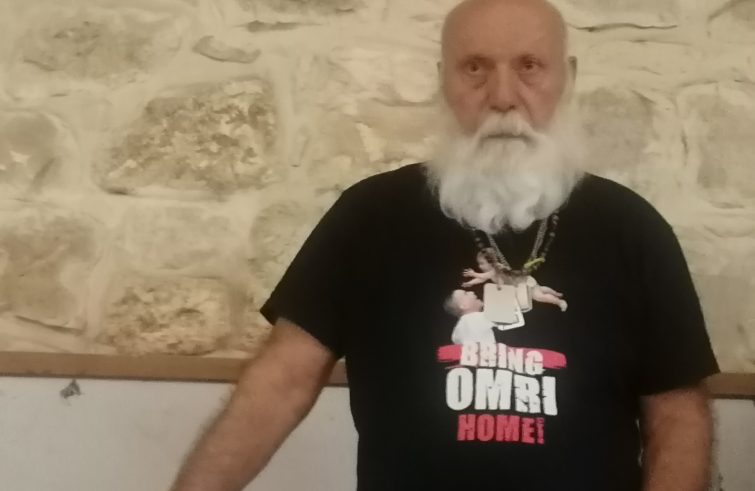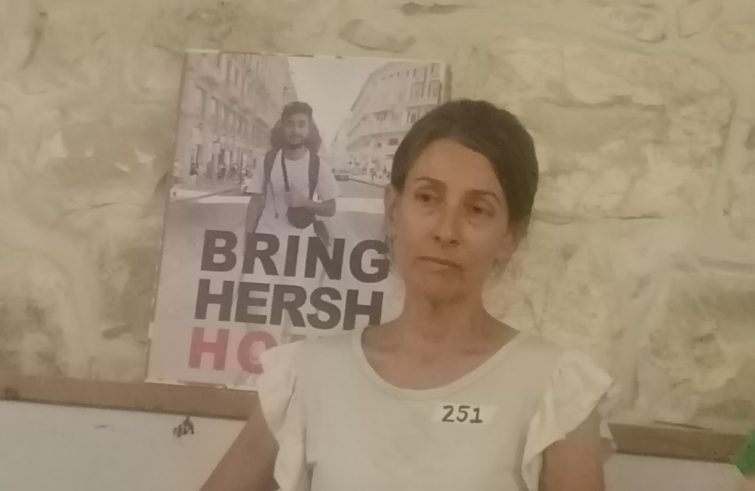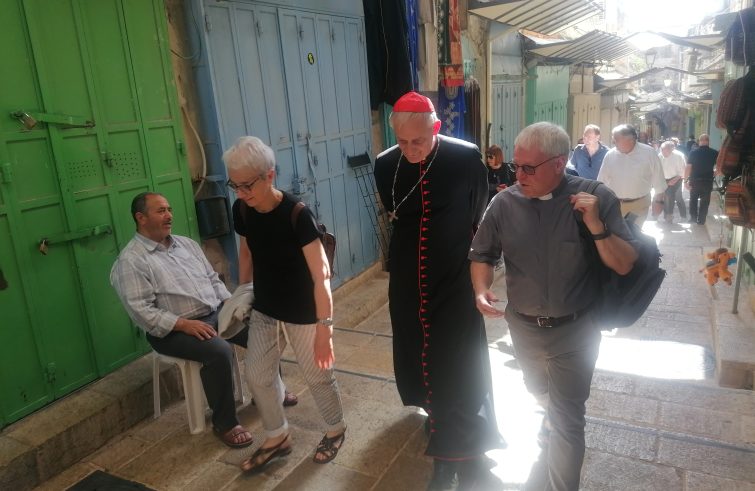
“The international community cannot abandon the ‘two peoples, two states’ solution. The actual question is the international community’s determination to pursue this solution and the way to make it happen. Peace is made not only by the warring parties, but also by the international community, which must be committed to finding avenues for negotiation.”
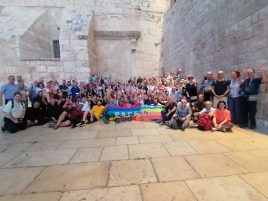 Cardinal Matteo Zuppi, Bishop of Bologna and President of the Italian Bishops’ Conference, made these remarks to SIR in the framework of the “Peace and Solidarity” pilgrimage to the Holy Land (Jerusalem and Bethlehem), involving 160 pilgrims from various Italian cities, organised in conjunction with the “Petroniana viaggi” (13-16 June). The delegation included representatives of the Italian Christian Workers’ Associations (ACLI) and other Catholic organisations, including AGESCI, the Pope John XXIII Association, Catholic Action, Communion and Liberation, the Community of Sant’Egidio, the Focolare Movement and Pax Christi, the latter represented by its President, Archbishop Giovanni Ricchiuti. “The purpose of our pilgrimage,” said Cardinal Zuppi, “was to show to the Christians in the region that we share in their suffering and to show our closeness at a time so tragically marked by suffering. We offered closeness, support, prayer, participation and intercession so that this suffering may end for all.”
Cardinal Matteo Zuppi, Bishop of Bologna and President of the Italian Bishops’ Conference, made these remarks to SIR in the framework of the “Peace and Solidarity” pilgrimage to the Holy Land (Jerusalem and Bethlehem), involving 160 pilgrims from various Italian cities, organised in conjunction with the “Petroniana viaggi” (13-16 June). The delegation included representatives of the Italian Christian Workers’ Associations (ACLI) and other Catholic organisations, including AGESCI, the Pope John XXIII Association, Catholic Action, Communion and Liberation, the Community of Sant’Egidio, the Focolare Movement and Pax Christi, the latter represented by its President, Archbishop Giovanni Ricchiuti. “The purpose of our pilgrimage,” said Cardinal Zuppi, “was to show to the Christians in the region that we share in their suffering and to show our closeness at a time so tragically marked by suffering. We offered closeness, support, prayer, participation and intercession so that this suffering may end for all.”
“The right moment”. It has been “a pilgrimage to the living stones that guard the holy places of Jesus”, said the Archbishop of Bologna, recalling the busy schedule of the visit, during which the pilgrims listened to the testimonies of representatives of Israeli civil society, including Rachel Goldberg-Polin, mother of Hersh, one of the hostages held by Hamas since 7 October, Ysca Harani, a practicing Jew and professor of the history of religions and Christianity, and visited charitable and educational institutions in Bethlehem, such as the Caritas Baby Hospital, the Effeta Institute for the hearing impaired, the la Crèche orphanage and the Hogar de ninos home for disabled children. The delegation also paid a visit to the small Christian communities in the villages of the West Bank (Ain Arik, Beit Sahour, Taybeh, Birzeit), “of which little has been heard since the 7 October terrorist attack by Hamas, the consequences of which are weighing heavily on the lives of the local population.” We listened to them and heard their pain, their hopes, the disappointments they have experienced over these past months. We offered the local Christian community our attention, concern and closeness,” said Zuppi. “It was the right time to do so, as the Latin Patriarch of Jerusalem, Cardinal Pierbattista Pizzaballa, confirmed, describing this pilgrimage as “a courageous gesture.” “I am pleased with the broad participation of the pilgrims. They are the face of the Italian Church, which has made herself present in this tormented land”.
Overcoming hatred. The Cardinal was especially touched by the testimonies of Rachel Goldberg-Poline and Dani Miran, respectively the mother of Hersh and the father of Omri Miran, two hostages still held by Hamas. “This mother, by refusing to make a ranking of suffering, has taught us a great lesson on how to eradicate hatred,” Zuppi said. “Hers is the experience of a love that heals, that comforts and wipes away all tears. Miran, the father of the other hostage, showed us a photograph of his meeting with Pope Francis, confessing that he saw his father’s eyes in the Pope’s. This touched me deeply because it shows that everyone can find in our closeness, concern and support the eyes of a father, mother and brother who shares in such immense suffering.”
“I believe that the Church must be ever closer to all those who suffer, with the feelings of a mother, a father, a brother.
Moreover, the Archbishop of Bologna continued, “we have also been presented with a description of a polarised Israeli society, in which many are absorbed by their own pain. This makes it necessary to rediscover sources of hope and rays of light. In this pilgrimage, we have taken up the urgent words of Pope Francis on the courage of a ceasefire and negotiations and made them our own, in full recognition of their importance.”
- Dani Miran (Foto Sir)
- Rachel Goldberg-Polin (Foto Sir)
The Christians’ voice. The visit to some villages in the West Bank was an opportunity for the pilgrims to witness the reality of the Israeli military occupation through the voices of the local Christian inhabitants.
Zuppi explained: “The occupation is a starting point. Unfortunately, the path of coexistence will be difficult to recover without a future prospect, without a solution that can be pursued”.
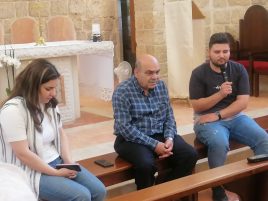 In this context, “the Christians of the Holy Land have a unique role to play in that their presence fosters encounter, precisely because of the nature of Christianity, which in all circumstances sees the other person as neighbour. The road ahead is long and must be travelled with great care and dedication.” But the military occupation, the crisis of employment and the lack of a stable future “do nothing other than fuel the exodus of Christians.” “The faithful leaving and the Holy Land becoming empty of its original inhabitants,” the Cardinal concluded, “is a risk we cannot afford. That is why it is all the more important to show our spiritual and concrete proximity to the communities of the Holy Land and to encourage them not to leave. It is our duty and a commitment to be pursued over time.”
In this context, “the Christians of the Holy Land have a unique role to play in that their presence fosters encounter, precisely because of the nature of Christianity, which in all circumstances sees the other person as neighbour. The road ahead is long and must be travelled with great care and dedication.” But the military occupation, the crisis of employment and the lack of a stable future “do nothing other than fuel the exodus of Christians.” “The faithful leaving and the Holy Land becoming empty of its original inhabitants,” the Cardinal concluded, “is a risk we cannot afford. That is why it is all the more important to show our spiritual and concrete proximity to the communities of the Holy Land and to encourage them not to leave. It is our duty and a commitment to be pursued over time.”

